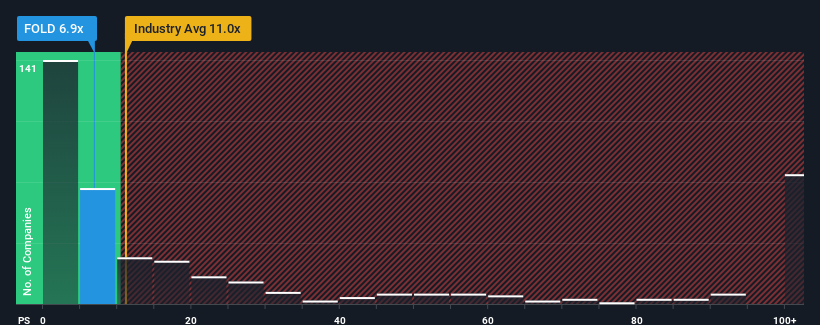- United States
- /
- Biotech
- /
- NasdaqGM:FOLD
Little Excitement Around Amicus Therapeutics, Inc.'s (NASDAQ:FOLD) Revenues

With a price-to-sales (or "P/S") ratio of 6.9x Amicus Therapeutics, Inc. (NASDAQ:FOLD) may be sending bullish signals at the moment, given that almost half of all the Biotechs companies in the United States have P/S ratios greater than 11x and even P/S higher than 63x are not unusual. Nonetheless, we'd need to dig a little deeper to determine if there is a rational basis for the reduced P/S.
Check out our latest analysis for Amicus Therapeutics

How Has Amicus Therapeutics Performed Recently?
Amicus Therapeutics could be doing better as it's been growing revenue less than most other companies lately. Perhaps the market is expecting the current trend of poor revenue growth to continue, which has kept the P/S suppressed. If this is the case, then existing shareholders will probably struggle to get excited about the future direction of the share price.
If you'd like to see what analysts are forecasting going forward, you should check out our free report on Amicus Therapeutics.What Are Revenue Growth Metrics Telling Us About The Low P/S?
There's an inherent assumption that a company should underperform the industry for P/S ratios like Amicus Therapeutics' to be considered reasonable.
If we review the last year of revenue growth, the company posted a terrific increase of 26%. Pleasingly, revenue has also lifted 59% in aggregate from three years ago, thanks to the last 12 months of growth. Therefore, it's fair to say the revenue growth recently has been superb for the company.
Turning to the outlook, the next three years should generate growth of 28% per annum as estimated by the twelve analysts watching the company. That's shaping up to be materially lower than the 202% per annum growth forecast for the broader industry.
In light of this, it's understandable that Amicus Therapeutics' P/S sits below the majority of other companies. Apparently many shareholders weren't comfortable holding on while the company is potentially eyeing a less prosperous future.
What Does Amicus Therapeutics' P/S Mean For Investors?
Generally, our preference is to limit the use of the price-to-sales ratio to establishing what the market thinks about the overall health of a company.
As we suspected, our examination of Amicus Therapeutics' analyst forecasts revealed that its inferior revenue outlook is contributing to its low P/S. Right now shareholders are accepting the low P/S as they concede future revenue probably won't provide any pleasant surprises. The company will need a change of fortune to justify the P/S rising higher in the future.
It is also worth noting that we have found 1 warning sign for Amicus Therapeutics that you need to take into consideration.
Of course, profitable companies with a history of great earnings growth are generally safer bets. So you may wish to see this free collection of other companies that have reasonable P/E ratios and have grown earnings strongly.
New: Manage All Your Stock Portfolios in One Place
We've created the ultimate portfolio companion for stock investors, and it's free.
• Connect an unlimited number of Portfolios and see your total in one currency
• Be alerted to new Warning Signs or Risks via email or mobile
• Track the Fair Value of your stocks
Have feedback on this article? Concerned about the content? Get in touch with us directly. Alternatively, email editorial-team (at) simplywallst.com.
This article by Simply Wall St is general in nature. We provide commentary based on historical data and analyst forecasts only using an unbiased methodology and our articles are not intended to be financial advice. It does not constitute a recommendation to buy or sell any stock, and does not take account of your objectives, or your financial situation. We aim to bring you long-term focused analysis driven by fundamental data. Note that our analysis may not factor in the latest price-sensitive company announcements or qualitative material. Simply Wall St has no position in any stocks mentioned.
Have feedback on this article? Concerned about the content? Get in touch with us directly. Alternatively, email editorial-team@simplywallst.com
About NasdaqGM:FOLD
Amicus Therapeutics
A biotechnology company, focuses on discovering, developing, and delivering novel medicines for rare diseases in the United States and internationally.
Undervalued with high growth potential.
Similar Companies
Market Insights
Community Narratives



